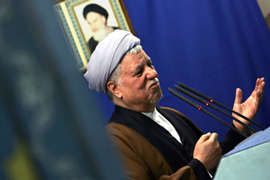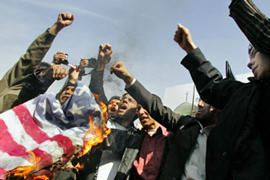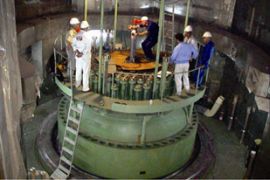The UN Security Council had given Iran until February 21 to halt uranium enrichment, a process that can make fuel for power plants or material for warheads.
The UN watchdog, the International Atomic Energy Agency [IAEA], said on Thursday that Iran had not heeded the demand.
The five permanent members of the UN Security Council plus Germany will meet in London on Monday to discuss possible further steps in addition to UN sanctions barring the transfer of nuclear technology and know-how that were imposed in December.
Rafsanjani’s advice
Separately, Akbar Hashemi Rafsanjani, the former Iranian president, said Western threats would not work.
“They will not get a result this way, it will just make problems for themselves, the world and especially our region,” he said in a Friday prayers sermon on state radio.
|
|
“The only way Iran prove it is enriching uranium for peaceful purposes is to allow its nuclear facilities to be inspected by the UN”
Mishmish, Egypt
Send us your views
|
But he also urged Iranians not to use language that would create more problems.
“We should keep our unity. Extremist people should control their tongue because these days simple statements can also bring danger to the Islamic nation.”
Rafsanjani’s comments appeared a veiled reference to Ahmadinejad and his anti-Western speeches, which have been blamed by those in a more moderate camp of politicians, like Rafsanjani, for exacerbating Iran’s problems with suspicious Western nations.
For her part, Condoleezza Rice, the US secretary of state, insisted on Friday that Washington was committed to diplomatic efforts to rein in Iran’s nuclear ambitions and that those efforts could succeed.
“We’ve been very clear that we’re on a diplomatic path, that we believe the diplomatic path can succeed if the international community stays unified in confronting Iran,” she said in Ottawa.
On the other hand, Dick Cheney, the US vice president, speaking to ABC News on a trip to Australia, said the US was keeping all options open in keeping Iran from acquiring nuclear weapons.
Ahmadinejad defiant
The Iranian president has said that when Iran has compromised over a nuclear programme, which it insists has only peaceful aims, the West had simply increased its demands.
 |
Rafsanjani said on Friday that “extremist
people should control their tongue” [AFP] |
Ahmadinejad is not the highest authority in the Islamic Republic, but his comments echo those of Supreme Leader Ayatollah Ali Khamenei, who has final say and has said previously that Iran would press ahead with its nuclear ambitions.
Speaking in Vienna after meeting Ban Ki-moon, the UN secretary-general, Mohamed ElBaradei, the IAEA head, expressed concern on Friday that Iran had not responded positively to the Security Council’s demands.
“We believe that the door is still open, that there is a window of opportunity for Iran and the international community to return to the negotiating table,” he said.
Timeout sought
ElBaradei reiterated his proposal of a “timeout” in which Iran’s nuclear enrichment programme and UN sanctions would be suspended to make a direct dialogue possible.
Iran previously suspended uranium enrichment under an agreement with the EU but that broke down in 2005. Ahmadinejad said earlier this week Iran would only halt its nuclear fuel work if those making such demands did too.
Additional penalties Iran might face for ignoring the UN demand include a travel ban on senior Iranian officials and restrictions on non-nuclear business.
Time for diplomacy
Henry Sokolski, executive director of the Non-proliferation Policy Education Centre in Washington, said: “The Russians and the Chinese have the measure of things.
 |
Iranian students protest in Tehran
against growing US pressure [AFP] |
“Everyone would prefer to have negotiations.”
But he said the IAEA report “puts the UN Security Council in the awkward position of having to do what it said it would do, which is more sanctions”.
Speaking on Al Jazeera, Gregory Schulte, a US ambassador to the IAEA, said: “The report is very persuasive … Iran has not suspended its activities”.
However, he also said that the position remains that there would still be scope for negotiations if Iran meets the conditions laid down by the UN.
“The good news is that Iran does not have nuclear weapons,” he said.
“There is still time for diplomacy”.


